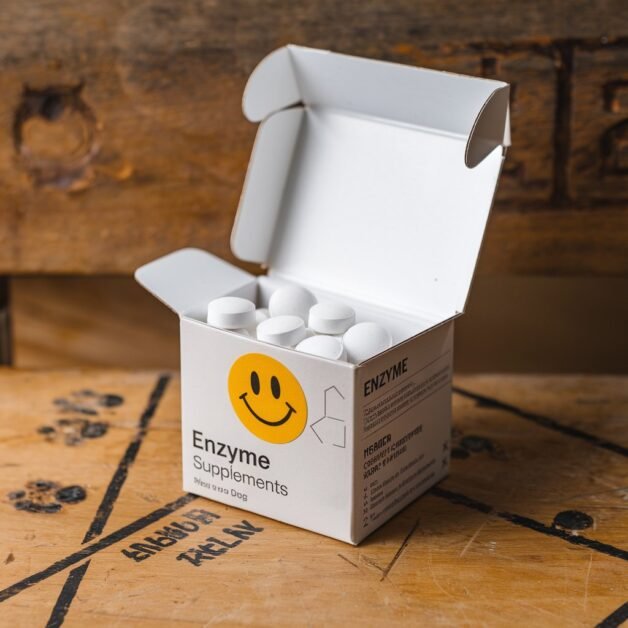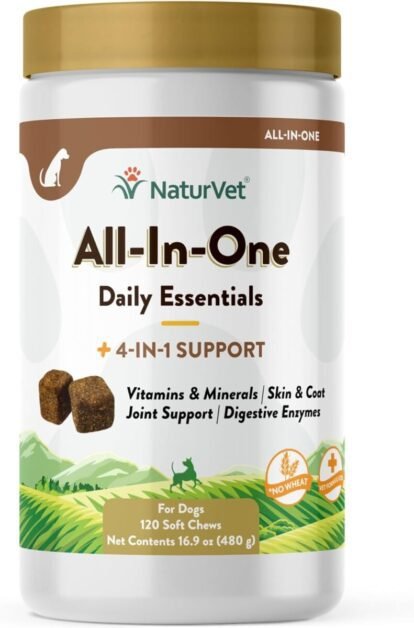Did you know up to 70% of dogs eating cooked food might not have the right enzymes? These supplements are key for dogs to digest food well and get the nutrients they need. We’ll look at the different types of enzyme supplements, their benefits, and how to add them to your dog’s diet.
Learning about digestive enzymes helps dog owners make better choices for their pets’ health. This guide will help you pick the right enzyme supplements for your dog, whether they’re old or young.
Key Takeaways
- Enzyme supplements are crucial for dogs to efficiently digest cooked foods.
- Different dosage recommendations apply based on the dog’s weight.
- Digestive enzymes support nutrient absorption and overall immune health.
- Regular use can help reduce inflammation and detoxify the system.
- It’s important to consult a veterinarian when introducing supplements.
- Potential side effects may occur, including digestive upset.
Table of Contents
Understanding Enzyme Supplements for Dogs

Enzyme supplements are key for dog digestive health. They are made of natural proteins that help with digestion. These supplements break down food, making it easier for your dog to absorb nutrients. They are great for dogs that need extra help with digestion.
Some studies show no big difference in digestibility with or without enzyme supplements for healthy dogs. But, dogs with certain health issues really need them. Dogs with pancreatitis or exocrine pancreatic insufficiency (EPI) rely on these supplements. German Shepherds and Rough-Coated Collies often have EPI, so enzyme supplements are vital for them.
Knowing what your dog needs is important when deciding on supplements. Tests like gut microbiome analysis can help find the right diet and supplements for your dog. Always talk to a vet to make sure you’re making the best choice for your dog’s health.
Benefits of Digestive Enzymes for Dogs
Digestive enzymes are key to a dog’s health, playing a big role in their overall wellness. They help break down food like proteins, fats, and carbs. This makes it easier for dogs to get the nutrients they need. These enzymes also help senior dogs and improve digestion in many ways.
Enhanced Nutrient Absorption
Digestive enzymes make it easier for dogs to absorb nutrients from their food. This means they get more energy and stay healthier. It also helps their immune system and overall vitality.
Support for Senior Dogs
Older dogs make less of their own enzymes, which can cause digestive problems. Enzyme supplements can help them digest food better. This keeps older dogs at a healthy weight and prevents stomach issues. Many owners see big improvements in their senior pets after adding these supplements to their diet.
Improvement in Digestive Health
Digestive enzymes also help dogs feel better in their stomachs. They can ease bloating, discomfort, and irregular bowel movements. Many owners say their dogs are happier and healthier when they use enzyme supplements.
| Benefit | Description |
|---|---|
| Enhanced Nutrient Absorption | Improves the breakdown of food for better usage of nutrients. |
| Support for Senior Dogs | Aids in digestion, helping to maintain health as dogs age. |
| Improvement in Digestive Health | Reduces bloating and gastric discomfort, promoting regular bowel movements. |
How Enzyme Supplements Help with Digestion
Enzyme supplements are key for dog digestive health. They help break down food, making it easier for dogs to get the nutrients they need. Since cooking food can destroy natural enzymes, dogs often need supplements.
A study on healthy neutered Beagle dogs showed how enzyme supplements help. Dogs were given either plant or animal enzymes with their food. The study found no big difference in digestibility, but it showed how important enzymes are for dogs.
There are three main types of digestive enzymes: proteases for proteins, lipases for fats, and amylases for carbs. Dogs with Exocrine Pancreatic Insufficiency (EPI) really need these supplements to digest their food right. This highlights how enzyme supplements are key for dogs to digest well and absorb nutrients.
- Proteases: Aid in protein digestion.
- Lipases: Assist in digesting fats.
- Amylases: Help break down carbohydrates.
For dogs with digestive problems or eating processed food, enzyme supplements can be a big help. Giving dogs the right enzymes helps keep them healthy and happy.
| Enzyme Type | Main Function | Example Foods |
|---|---|---|
| Proteases | Break down proteins into amino acids. | Meats, dairy products. |
| Lipases | Digest fats into fatty acids and glycerol. | Oils, animal fats. |
| Amylases | Convert starches into sugars. | Grains, vegetables. |
Types of Enzyme Supplements Available

When looking at ways to help a dog’s digestive health, it’s key to know the different enzyme supplements out there. Pet owners can pick from natural digestive enzymes for dogs or synthetic enzyme supplements. Each has its own benefits and things to consider.
Natural Digestive Enzymes
Natural digestive enzymes for dogs come from animals or plants. They work well with a dog’s digestive system. These enzymes break down food into nutrients that dogs need.
They include proteases, amylases, and lipases. These enzymes help digest proteins, carbs, and fats. Many holistic vets suggest these natural enzymes for better gut health and overall health.
Synthetic Enzyme Supplements
Synthetic enzyme supplements work well but might not have all the benefits of natural ones. They don’t have probiotics and prebiotics that help gut health. While they help with digestion, they might not be as good for overall health as natural ones.
Pet owners thinking about synthetic options should think about their dog’s needs and the possible downsides. These include the risk of harming the pancreas if used too much.
| Type of Supplement | Source | Benefits | Considerations |
|---|---|---|---|
| Natural Digestive Enzymes | Animal or Plant Sources | More compatible with canine digestion, enhances gut health | May be more expensive, variability in quality |
| Synthetic Enzyme Supplements | Laboratory-produced | Convenient, often more affordable | Potential risk of dependency, may lack additional benefits |
Best Enzyme Supplements for Dogs Health & Digestion
Choosing the right enzyme supplements for dogs can greatly improve their health and digestion. There are many options out there that help support their digestive systems. One top choice is NaturVet® Digestive Enzymes Dog Soft Chews. It has important enzymes to help dogs absorb nutrients better.

These supplements are great for dogs with chronic pancreatitis, malabsorption, or food intolerances. Using them regularly can make digestion better, especially for older dogs and those eating cooked food. They often include natural stuff like grass-fed bovine pancreas and probiotics for a holistic digestive care.
When picking an enzyme supplement, think about what your dog eats and any health issues they have. Always talk to a vet to find the best product for your dog’s needs.
| Body Weight | Recommended Daily Dose | Supply Duration | Daily Cost |
|---|---|---|---|
| 1-30 lbs | 1/4 tsp | 45 days | $0.50 |
| 31-60 lbs | 1/2 tsp | 30 days | $1.00 |
| 61-100 lbs | 3/4 tsp | 22 days | $1.50 |
| 100 + lbs | 1 tsp | 15 days | $2.00 |
Keep these supplements in a cool, dark spot to keep them working well. They should be given orally once a day for the best effect. Using the best enzyme supplements can really help your dog’s health, making them happier and healthier.
Key Ingredients in Canine Enzyme Supplements
Canine enzyme supplements are key for your dog’s digestive health. They have various ingredients that help with nutrient absorption and gut function. Knowing about these ingredients helps dog owners choose the best for their pets.
Protease, Amylase, and Lipase Explained
Protease, amylase, and lipase are vital enzymes in many supplements. They work in different ways:
- Protease: Breaks down proteins into smaller pieces for better use.
- Amylase: Helps digest starchy carbs, making sugars easier to absorb.
- Lipase: Helps with fat digestion, ensuring your dog gets essential fatty acids.
These enzymes are key for your dog’s digestion. They make sure your dog gets the nutrients they need for health. Some supplements also add digestive enzymes like bromelain and papain to boost digestive power.
The Role of Probiotics in Digestive Health
Probiotics for dogs are crucial in enzyme supplements. They keep the gut microbiome balanced, which is vital for digestion. Probiotics help good bacteria grow, improving digestion, nutrient absorption, and regularity.
Vetri Probiotic BD™ gives your dog over 10 million CFU of good bacteria per chewable tablet. Ingredients like Lactobacillus casei and Enterococcus faecium help with digestion and gut health.
When probiotics and enzymes work together, they offer a full solution for canine digestive health. This is especially helpful for dogs with food sensitivities or digestive problems.
Recommended Dosage for Dog Owners
Dosing enzyme supplements for dogs is important and depends on their weight and age. The dosage recommendations for enzyme supplements change a lot. This ensures each dog gets the right support for its size and needs. It’s key for owners to know how these factors affect enzyme supplements.
Daily Intake Based on Weight
Figuring out the right amount of enzyme supplements for dogs by weight is helpful. Here’s a table with typical daily dosages for different dog weights:
| Weight Range (lbs) | Dosage (tsp) |
|---|---|
| 1 – 30 | 1/4 |
| 31 – 60 | 1/2 |
| 61 – 90 | 3/4 |
| 91+ | 1 |
Dogs with Exocrine Pancreatic Insufficiency (EPI) might need 1/2 to 1 teaspoon of Pancreatin 6x Powder per cup of kibble. This depends on their individual needs. Always check product guidelines or talk to a vet for advice on your pet.
Age Considerations for Supplementation
Age is key when deciding on enzyme supplement dosage. Older dogs often make less natural enzymes, so they might need more supplements. Young, healthy dogs usually need less, but it’s best to adjust with expert advice. Watching a senior dog’s health closely will show if the supplements are working well.
Potential Side Effects of Enzyme Supplements
When thinking about enzyme supplements for dogs, knowing the possible side effects is key. These supplements can help a lot, but they might also cause stomach issues in some dogs.
The most common side effects include:
- Diarrhea
- Increased gas
- Cramping
- Vomiting
Using strong forms of pancrelipase can cause bigger problems, like mouth sores, bleeding, or trouble swallowing. Taking too much of these supplements is dangerous and needs vet help right away. It’s important to watch how your dog feels while taking these supplements. Look for changes in weight, stool, and how often they go.
Sometimes, high doses can lead to serious issues, but this is rare. Finding the right amount is key for your pet’s comfort and health. Always talk to a vet before changing your dog’s diet or supplements, especially if your pet is getting older. Enzyme production can go down with age, making things harder for older pets.
| Potential Side Effects | Description |
|---|---|
| Diarrhea | Loose stools that may occur after starting enzyme supplements. |
| Increased gas | Bloating or flatulence that can be irritating for dogs. |
| Cramping | Painful contractions in the stomach area, leading to discomfort. |
| Oral Ulcers | Sores that may develop in the mouth due to high concentrations of certain enzymes. |
| Vomiting | Throwing up, which can indicate intolerance to the enzyme supplement. |
| Serious Reactions | Unusual bleeding or difficulty swallowing, which requires urgent veterinary care. |
Knowing about these side effects helps you make smart choices about enzyme supplements for your dog. Watching your pet closely can help you make any needed changes. This way, your pet can stay healthy and happy.
Precautions When Using Digestive Enzyme Supplements
When thinking about digestive enzyme supplements for dogs, it’s key to be careful. Always talk to a vet before starting these supplements, especially if your dog has health issues or special diet needs.
Consulting Your Veterinarian
Talking to your vet before adding enzyme supplements to your dog’s diet is a must. They can check if these supplements are right for your dog. Since these enzymes come from pork and aren’t approved by the FDA for pets, a vet can make the best choice for your dog’s health.
Recognizing Allergies and Food Intolerances
Watch for any signs of allergies or food issues when starting enzyme supplements. Look out for itching, stomach problems, or changes in how your dog acts. If you see these signs, talk to your vet right away. Remember, if your dog is allergic to pork, these supplements are not a good idea. Knowing these things helps keep your pet safe and healthy.
Natural Alternatives and Complementary Therapies
Looking into natural digestive enzymes for dogs can help improve their digestive health. Foods like pineapple and papaya are great because they’re full of these enzymes. They give your pet a nutritional boost.
Probiotics and prebiotics are also key. They help keep the good bacteria in the gut balanced. This is important because most of the immune system is in the gut.
When thinking about therapies for dogs, there are many options. Traditional Chinese Veterinary Medicine (TCVM) uses holistic methods like acupuncture. It helps balance the body and improve digestion.
Veterinary Orthopedic Manipulation (VOM) is another option. It’s good for overall health and is best started early in a dog’s life. Ozone therapy can also help by boosting the immune system and making more immune cells.
Then there’s Fecal Microbiota Transplantation (FMT). It can really help improve your dog’s digestion.
It’s important to talk to a vet before trying these natural remedies and therapies. This makes sure they’re right for your dog’s health needs. It helps get the most out of natural digestive enzymes and other treatments.
Signs of Digestive Enzyme Deficiencies in Dogs

It’s key to know the signs of enzyme deficiencies in dogs for early treatment. Dogs without enough digestive enzymes face health problems. Spotting these signs early helps pet owners help their dogs.
Common Health Issues Related to Deficiency
Long-term enzyme shortages can cause Exocrine Pancreatic Insufficiency (EPI). This is common in breeds like German Shepherds and Cairn Terriers. EPI makes it hard for dogs to absorb nutrients, leading to malnutrition even with a big appetite. Chronic pancreatitis can also cause these symptoms, making health issues worse. Here’s a table that lists common health problems from enzyme shortages in dogs:
| Health Issue | Description |
|---|---|
| Exocrine Pancreatic Insufficiency (EPI) | Insufficient enzyme production results in malnutrition, chronic diarrhea, and weight loss. |
| Chronic Pancreatitis | Inflammation of the pancreas, causing intermittent vomiting and digestive disturbances. |
| Inflammatory Bowel Disease (IBD) | A condition that leads to inflammation of the intestines, often resulting in diarrhea and weight loss. |
Symptoms to Watch For
It’s crucial to spot enzyme deficiency symptoms early. Look out for these signs in dogs:
- Poor appetite
- Weight loss despite a normal or increased appetite
- Loose or abnormal stool consistency
- Vomiting
- By eating feces or other objects
- Poor coat condition
- Excessive appetite
These signs suggest health problems from enzyme deficiency. Keeping an eye on your dog’s digestive health is key. Getting vet advice and testing for digestive enzymes can greatly improve your dog’s life.
Combining Enzyme Supplements with Other Supplements
Adding enzyme supplements to your dog’s diet with probiotics or omega fatty acids can boost their digestive health. This mix helps with better nutrient absorption and supports many body functions. It ensures your dog gets a balanced intake for their health.
It’s important to think about the enzymes you’re using. For example, protease and lipase work well with probiotics, making both more effective. Studies show that adding certain enzymes can lessen the bad effects of some foods, making digestion better.
But, it’s key to measure the supplements correctly. Too much of anything can harm your dog, not help them. Always talk to a vet before starting any new supplements to make sure they’re right for your dog.
| Supplement Type | Key Benefits | Considerations |
|---|---|---|
| Enzyme Supplements | Improve nutrient absorption and aid digestion | Consult with a veterinarian for accurate dosing |
| Probiotics | Support gut health and immune function | Choose high-quality strains effective for dogs |
| Omega Fatty Acids | Enhance skin health and reduce inflammation | Monitor for any allergic reactions |
Combining enzyme supplements with other ingredients aims for a complete health plan. By supplementing wisely, pet owners can help their dogs live happy, healthy lives.
Homemade Recipes for Dogs with Digestive Issues
Making homemade dog food can really help dogs with digestive problems. Many dogs have issues that need special diets. Using foods full of digestive enzymes can help ease their discomfort and boost their health.
When making homemade dog food for digestive health, pick ingredients that are easy on the stomach and packed with nutrients. Here are some good things to add to recipes for dogs with digestive issues:
- Pumpkin – It’s full of fiber and helps with digestion.
- Pineapple – Has bromelain, an enzyme that breaks down proteins.
- Fermented vegetables – They boost gut health with good bacteria.
- Fresh fruits – Kiwi and papaya add digestive enzymes.
- Turmeric – It has anti-inflammatory properties that ease digestive pain.
A simple recipe includes:
- Pumpkin and Turkey Mix:
- 1 cup organic pumpkin puree
- 1 cup cooked turkey (chopped)
- ½ cup sweet potato (mashed)
- 1 tablespoon organic honey
- 1 teaspoon of ground turmeric
- Fruity Kefir Blend:
- 1 cup raw organic kefir or goat’s milk
- 1 cup chopped melons (cantaloupe or seedless watermelon)
- ½ cup fresh pineapple (diced)
- 1 banana (sliced)
- 1 teaspoon grated fresh ginger
These recipes can help with digestion and give dogs important nutrients. Dogs with ongoing digestive problems, like Exocrine Pancreatic Insufficiency or irritable bowel syndrome, do well on special diets. Using easy-to-digest ingredients makes sure they get the nutrients they need without making things worse.
| Ingredient | Benefits | Preparation Method |
|---|---|---|
| Pumpkin | Rich in fiber, aids digestion | Canned or fresh, cooked and mashed |
| Pineapple | Contains bromelain for protein breakdown | Fresh, chopped |
| Sweet Potatoes | Easily digestible, nutrient-rich | Boiled or baked and mashed |
| Turkey | Lean protein, gentle on stomach | Cooked and finely chopped |
| Ginger | Soothes gut inflammation | Fresh, grated |
Talking to a vet or a canine nutritionist can help make these recipes for dogs with digestive issues fit their specific needs. Making dog food at home not only helps their health but also strengthens the bond with their owners.
Foods That Are Rich in Digestive Enzymes for Dogs
Adding dog foods rich in digestive enzymes to a dog’s diet is very beneficial. Some natural foods work well with enzyme supplements to help with digestion and health. Raw meats, fish, and fermented veggies are great because they have digestive enzymes that break down nutrients well.
Here are some important foods to think about:
- Raw Meat: It has natural proteases that help break down proteins.
- Fish: It has enzymes that are good for digesting fats.
- Pineapple: This fruit is full of bromelain, which helps with protein digestion.
- Papaya: It has papain, an enzyme that helps with protein digestion.
- Mango: It has amylase, which is important for breaking down carbs.
- Kiwi: It has actinidin, which helps with protein digestion.
- Fermented Vegetables: These have probiotics and enzymes that are good for gut health.
Adding these foods to your dog’s meals can make their digestion and nutrient absorption better. These natural digestive enzymes work well with enzyme supplements in a dog’s diet. This balanced approach helps with better digestive health and overall well-being for dogs.
| Food | Key Enzymes | Main Benefits |
|---|---|---|
| Raw Meat | Proteases | Breaks down proteins, enhancing nutrient absorption. |
| Fish | Lipases | Assists in the digestion of fats. |
| Pineapple | Bromelain | Aids protein digestion and reduces inflammation. |
| Papaya | Papain | Enhances protein breakdown, supports digestive health. |
| Mango | Amylase | Facilitates carbohydrate digestion. |
| Kiwi | Actinidin | Supports protein digestion and overall gut health. |
| Fermented Vegetables | Probiotics & Enzymes | Promotes gut flora balance and digestion. |
Cost Analysis of Enzyme Supplements for Dogs
The cost of enzyme supplements for dogs varies a lot. It depends on the brand, type, and how much you get. Prices usually range from $18.99 to $30 for a month’s supply. It’s important to think about your dog’s size and how much they need when looking at prices.
Knowing how much enzyme supplements cost helps with budget planning. Brands like NaturVet, PetHonesty, Zesty Paws, and Animal Essentials offer good products. They provide health benefits without costing too much.
| Brand | Product Type | Price Range (USD) | Key Benefits |
|---|---|---|---|
| NaturVet | Powder | $18.99 – $25.99 | Supports digestion and nutrient absorption |
| PetHonesty | Chews | $24.99 – $30.00 | Enhances appetite and reduces digestive discomfort |
| Zesty Paws | Soft Chews | $19.99 – $29.99 | Promotes gut health and overall well-being |
| Animal Essentials | Powder | $22.99 – $29.99 | Facilitates protein digestion and nutrient utilization |
The North America Pet Digestive Enzyme Supplement Market is expected to grow. This is because many dogs have digestive problems. Spending on good enzyme supplements can help your pet’s health in the long run. It’s a smart choice for any pet owner.
Customer Reviews of Top Enzyme Supplements
Customer feedback on dog supplements is very helpful when looking at enzyme supplements for dogs. Many dog owners talk about how certain products have really helped their pets. They say these supplements help with digestion and make their dogs healthier.
The Vetri Probiotic BD™ is often praised in reviews. Owners love its high-quality ingredients, like over 10 million CFU of beneficial bacteria in each tablet. It’s easy to know how much to give your dog because of clear dosage guidelines. Ingredients like Lactobacillus casei and enterococci supplements show the brand’s commitment to quality, which gets a lot of positive feedback.
- Positive results in nutrient absorption
- Improvement in overall digestive health
- Support for senior dogs
The Daily Digestive Enzymes for Pets is also a favorite. Customers like its mix of nine enzymes for different digestion needs. The Bioactive Protein Peptide System technology makes the enzymes more stable and easier to absorb, which gets good reviews. With about 100 scoops per container, it’s easy for dog owners to use.
Overall, reviews of these enzyme supplements show they work well and are important for dogs’ health. Choosing the right product for your dog is easier with real feedback from other owners. This helps pet owners make better choices, avoiding just trusting ads.
Conclusion
Enzyme supplements for dogs are key to their health and better digestion. They help with nutrient absorption and support older dogs. Pet owners can choose the right supplements for their pets by knowing these benefits.
Choosing the right digestive enzyme supplements is crucial. It’s best to pick natural ones that match your dog’s needs. But, some dogs might need synthetic options for health issues.
Getting the right enzyme supplements helps your dog’s digestion and overall health. Keeping up with your dog’s health and talking to your vet is important. This ensures your dog gets the nutrients they need for a happy and healthy life.























